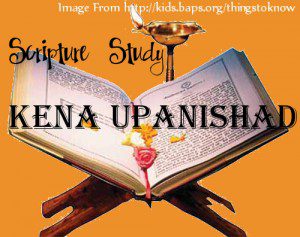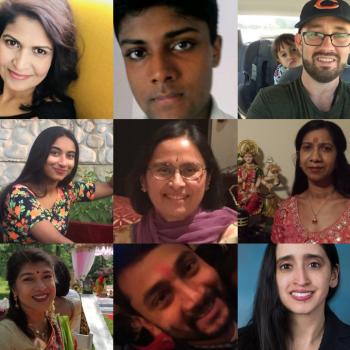We are doing a scripture study together: reading along through some scriptures and discussing the passages. Today is the third post on the Kena Upanishad. The previous scripture was the Isha Upanishad (find all Scripture posts here)
Here are a few different translations of the third section of the Kena Upanishad…
Chapter III
1
Brahman, according to the story, obtained a victory for the gods; and by that victory of Brahman the gods became elated. They said to themselves: “Verily, this victory is ours; verily, this glory is ours only.”
2
Brahman, to be sure, understood it all and appeared before them. But they did not know who that adorable Spirit was.
3-6
They said to Agni (Fire): “O Agni! Find out who this great Spirit is.” “Yes,” he said, and hastened to It. Brahman asked him: “Who are you?” He replied: “I am known as Agni; I am also called Jātavedā.” Brahman said: “What power is in you, who are so well known?” Fire replied: “I can burn all—whatever there is on earth.” Brahman put a straw before him and said: “Burn this.” He rushed toward it with all his ardour but could not burn it. Then he returned from the Spirit and said to the gods: “I could not find out who this Spirit is.”
7-10
Then they said to Vāyu (Air): “O Vāyu! Find out who this great Spirit is.” “Yes,” he said, and hastened to It. Brahman asked him: “Who are you?” He replied: “I am known as Vāyu; I am also called Mātariśvā.” Brahman said: “What power is in you, who are so well known?” Vāyu replied: “I can carry off all—whatever there is on earth.” Brahman put a straw before him and said: “Carry this.” He rushed toward it with all his ardour but could not move it. Then he returned from the Spirit and said to the gods: “I could not find out who this Spirit is.”
11-12
Then the gods said to Indra: “O Maghavan! Find out who this great Spirit is.” “Yes,” he said and hastened to It. But the Spirit disappeared from him. Then Indra beheld in that very region of the sky a Woman highly adorned. She was Umā, the daughter of the Himālayas. He approached Her and said: “Who is this great Spirit?”
–Translated by Swāmi Nikhilānanda
Part Third
I
- The Brahman once won a victory for the Devas. Through that victory of the Brahman, the Devas became elated. They thought, “This victory is ours. This glory is ours.”
- [Brahman here does not mean a personal Deity. There is a Brahma, the first person of the Hindu Trinity; but Brahman is the Absolute, the One without a second, the essence of all. There are different names and forms which represent certain personal aspects of Divinity, such as Brahma the Creator, Vishnu the Preserver and Siva the Transformer; but no one of these can fully represent the Whole. Brahman is the vast ocean of being, on which rise numberless ripples and waves of manifestation. From the smallest atomic form to a Deva or an angel, all spring from that limitless ocean of Brahman, the inexhaustible Source of life. No manifested form of life can be independent of its source, just as no wave, however mighty, can be independent of the ocean. Nothing moves without that Power. He is the only Doer.]
- But the Devas thought: “This victory is ours, this glory is ours.”
II
- The Brahman perceived this and appeared before them. They did not know what mysterious form it was.
III
- They said to Fire: “O Jataveda (All–knowing)! Find out what mysterious spirit this is.” He said: “Yes.”
IV
- He ran towards it and He (Brahman) said to him: “Who art thou?” “I am Agni, I am Jataveda,” he (the Fire–god) replied.
V
- Brahman asked: “What power resides in thee?” Agni replied: “I can burn up all whatsoever exists on earth.”
VI
- Brahman placed a straw before him and said: “Burn this.” He (Agni) rushed towards it with all speed, but was not able to burn it. So he returned from there and said (to the Devas): “I was not able to find out what this great mystery is.”
VII
- Then they said to Vayu (the Air–god): “Vayu! Find out what this mystery is.” He said: “Yes.”
VIII
- He ran towards it and He (Brahman) said to him: “Who art thou?” “I am Vayu, I am Matarisva (traveller of Heaven),” he (Vayu) said.
IX
- Then the Brahman said: “What power is in thee?” Vayu replied: “I can blow away all whatsoever exists on earth.”
X
- Brahman placed a straw before him and said: “Blow this away.” He (Vayu) rushed towards it with all speed, but was not able to blow it away. So he returned from there and said (to the Devas): “I was not able to find out what this great mystery is.”
XI
- Then they said to Indra: “O Maghavan (Worshipful One)! Find out what this mystery is.” He said: “Yes”; and ran towards it, but it disappeared before him.
XII
- Then he saw in that very space a woman beautifully adorned, Uma of golden hue, daughter of Haimavat (Himalaya). He asked: “What is this great mystery?” Here we see how the Absolute assumes concrete form to give knowledge of Himself to the earnest seeker. Brahman, the impenetrable mystery, disappeared and in His place appeared a personal form to represent Him. This is a subtle way of showing the difference between the Absolute and the personal aspects of Deity. The Absolute is declared to be unknowable and unthinkable, but He assumes deified personal aspects to make Himself known to His devotees. Thus Uma, daughter of the Himalaya, represents that personal aspect as the offspring of the Infinite Being; while the Himalaya stands as the symbol of the Eternal, Unchangeable One.
–http://www.yoga-age.com/upanishads/kena.html
This section admonishes us to remember that what we accomplish is done through the energy of God. I think we tend to attribute our successes to ourselves (and our ego, small selves, not the divinity within us), yet we attribute our failures and sorrows to God!
As one of these translators points out, when we say Brahman, we are not talking about one of the personified Gods. Each branch of Hinduism will claim that their most revered personal God is actually the One Power behind all others. To me, there is One Supreme Power and it does not matter which name you call It by. It can be called Shiva. It can be called Krishna. It can be called Vishnu. It is beyond names and forms and it permeates everything equally. That is what the word Brahman represents here: the power that is greater than all others that gives breath to all the universe.
What is the Kena Upanishad? There are hundreds of Upanishads, but ten are considered principle texts, the most important ones. These were written approximately 1000 years BCE. The word translates to “by whom,” which refers to the opening question of the text.















